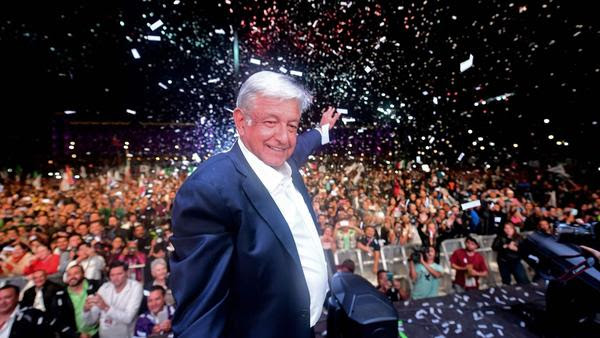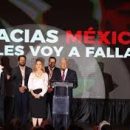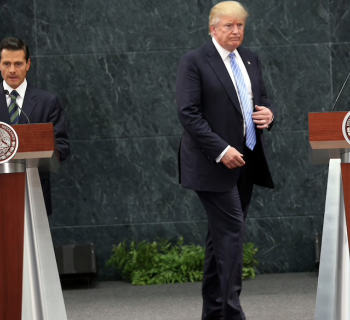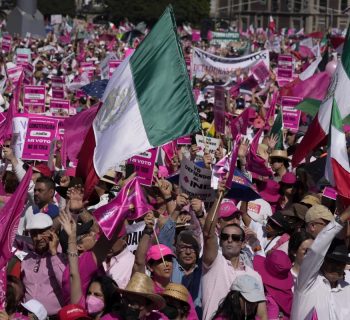By Patrick J. McDonnell and Katie Linthicum ~ LA Times ~ July 1, 2018
A new era in politics in Mexico could have profound implications there — and in the U.S.
In Mexico’s election on Sunday, voters sent a message: They’re fed up with the country’s rampant corruption, escalating crime and sluggish economy. In a landslide, they selectedleftist candidate Andres Manuel Lopez Obrador as their next president. AMLO, as he is known, had run and lost twice before, but this time his campaign struck a chord — and delivered another victory in the march of populism, which has gained traction not only in the U.S. but also Europe, albeit mostly on the right. Lopez Obrador is expected to be less deferential to Washington than his predecessors, but what that means for U.S.-Mexico relations is unclear. Among the many foreign leaders offering congratulations: President Trump.
Leftist Andres Manuel Lopez Obrador won Sunday’s presidential election by a landslide, ushering in a new era in Mexican politics that could have profound implications for the country’s domestic and international policies — including its relationship with the United States.
Lopez Obrador’s projected margin of victory was 31 percentage points — the largest in Mexico’s recent electoral history. His opponents conceded before any actual results were released, based on exit polls showing the firebrand populist’s commanding lead.
Lopez Obrador’s National Regeneration Movement — a relatively new political bloc known as Morena — appeared headed for significant victories in congressional and gubernatorial races, according to exit polls.
It was unclear late Sunday whether Lopez Obrador’s party and its allies would garner sufficient victories to forge a majority in Mexico’s Congress, thus assisting the new president in implementing his sweeping legislative agenda.
Mexico’s electoral institute declared that a partial count confirmed the victory of Lopez Obrador, who would become president-elect once the final results are certified. In a race of four main candidates, it said he was on pace to win 53% of the vote.
Mexico’s current president, Enrique Peña Nieto, also went on national television to confirm Lopez Obrador’s ascension to the chief executive post.
A smiling Lopez Obrador left his campaign headquarters in the capital’s Roma district in a white Volkswagen sedan, which was mobbed by well-wishers and supporters seeking selfies as the car made its way to his campaign headquarters along the elegant Paseo de la Reforma boulevard.
“This is a historic day,” Lopez Obrador declared in a speech at a hotel downtown where supporters gathered. He vowed to seek an “authentic democracy” and rejected charges that he sought to impose a “dictatorship” on the country. “Under no circumstances will the next president of the republic allow corruption or impunity.”
No one will be spared, he said, not members of his party, not his friends. He called for "reconciliation" with opposition parties and pledged to represent the interests of all Mexicans, but said his priority would be the country's poor and indigenous.
"We will respect everybody but we will give a preference to the humble and forgotten," he said.
A celebratory scene enveloped downtown Mexico City as the country witnessed the election of its first opposition leader avowedly from the left.
His election could mark a new political era for Mexico, even though Lopez Obrador was a stalwart of the long-ruling Institutional Revolutionary Party, or PRI, before he and others on the left broke away in the late 1980s.
"There is no more happiness than knowing your country is liberated," said Blanca Rosa Rubacalba, 76, sobbing and clutching a Mexican flag in a crowd gathered outside the hotel.
“Liberated from the corruption, the robbery, the lies,” she said. “I can die now.”
Mexicans go to the polls to vote for a new president in Colonia La Malinche in Mexico City on July 1. Also up for grabs are 500 seats of the Chamber of Deputies and 128 in the Senate. (Gary Coronado / Los Angeles Times)
It was a stunning and momentous win for a lifelong politician and relentless campaigner who had lost the previous two presidential elections — and in both instances alleged that he had been robbed of victory through fraud. His critics dismissed him as a sore loser, a crank and a would-be Hugo Chavez, after Venezuela’s late leftist leader.
But the third try proved the charm for Lopez Obrador, 64, a shopkeeper’s son from the southern state of Tabasco who rode to victory on a wave of voter discontent with rampant corruption, escalating crime and a sluggish economy.
Once his victory is confirmed, he is set to take office on Dec. 1.
Among the many foreign leaders offering congratulations was President Trump, who said in a Twitter message that he looked forward to working with Mexico’s new leader.
“There is much to be done that will benefit both the United States and Mexico!” said Trump, who has consistently singled out Mexico and Mexicans for withering criticism on issues of free trade, drug trafficking and illegal immigration.
As president, Lopez Obrador — who embraces a throwback, fiercely nationalist tradition — is widely expected to be less deferential to Washington than his predecessors. How his presidency will play out in U.S.-Mexico relations remains to be seen.
He said during the campaign that he was keen to have good relations with Washington and was in favor of negotiating a new free-trade deal with the United States. In his acceptance speech on Sunday, he said he sought a relationship of “friendship” and “mutual respect” with the United States.
Lopez Obrador has vowed a grandiose “transformation” of Mexico akin to past historical events — independence from Spain, the 19th century reign of President Benito Juarez, and the Mexican Revolution of the early 20th century. He repeatedly denounced corruption. But critics accused him of being a would-be dictator.
Shortly after the last polls closed at 8 p.m. in Mexico City, and before any actual results were released, the other candidates began conceding defeat.
“I recognize that the tendencies do not favor me,” Jose Antonio Meade, presidential hopeful of the PRI, said in a speech. “At this moment I will have to recognize that, in accordance with the tendencies, it was Andres Manuel Lopez Obrador who obtained the majority. He will have the responsibility of directing executive power. And for the good of Mexico I wish him the best success.”
Ricardo Anaya of the center-right National Action Party soon followed, as did the sole independent candidate, Jaime "El Bronco" Rodriguez.
"I wish him success for the best of Mexico," Anaya said.
Election officials projected Anaya would win 22% of the vote, Meade 16% and Rodriguez 5%.
Lopez Obrador’s lead was even bigger than his sizable advantage in preelection surveys that had long showed him as a runaway winner. His challengers had been unable to chip away at Lopez Obrador’s lead, which was largely fueled by voter anger at the status quo of Mexican politics.
Mexico’s political class appeared astonished, despite the months of preelection polls.
“We have an electoral tsunami,” Marco A. Fernandez, an analyst at the Technical Institute of Monterrey, said in a Twitter message. “High electoral participation punished corruption at the ballot [box]. The citizens participated and expressed their outrage and anger.”
The electoral process unfolded without major disruptions, authorities said, despite scattered acts of violence and some reports of missing ballots.
In the run-up to the elections, dozens of office-seekers had been slain, mostly candidates for local posts in provincial areas where organized crime holds sway. Police were out in force on Sunday throughout the nation in elections that officials called the largest in the country’s history.
Apart from the presidential vote, Mexicans were also electing a new federal legislature, eight state governors, a Mexico City mayor and representatives for thousands of state and municipal posts.
Lopez Obrador — a former mayor of Mexico City — launched his Morena movement four years ago after splitting from the center-left party that he formerly headed.
Front-runner presidential candidate Andres Manuel Lopez Obrador cast his vote in Coyoacán on election day in Mexico City on July 1, 2018. (Gary Coronado / Los Angeles Times)
His rhetoric has targeted “the mafia of power,” his depiction of the elite clique of political parties and business interests that have long dominated Mexico. It is an anti-status quo message that has overwhelmed similar vows of “change” from the presidential aspirants from more traditional parties.
Among his promises: increasing social welfare payments to the poor and elderly, providing scholarships to the young and reviewing various projects of the current government, including energy and education reforms and the construction of a new Mexico City airport.
“We are struggling,” said Ivan Jaramillo, 36, a tall, tattooed industrial engineer and Lopez Obrador backer who cast his ballot Sunday. “Yet we see how our leaders get richer.”
Lopez Obrador’s fiery rhetoric has clearly drawn many supporters, but his candidacy has also stoked deep concern among many who view him as a potential autocrat and as an unreconstructed leftist who could wreck an already shaky economy.
In the wealthy Mexico City enclave of Bosques de las Lomas, Veronica Soto, 46, stepped into a waiting Audi sedan after casting her ballot.
Soto, a stay-at-home mom, said she was voting for Anaya, the presidential candidate of the National Action Party, largely because she is afraid of a Lopez Obrador presidency — a fear especially common among upper-class Mexicans.
“He wants to take Mexico backward,” she said, “to a situation where the poor won’t be rich and the rich won’t be rich either.”
She said many in this neighborhood of lush haciendas tucked behind high walls were nervous about what will happen to the economy under Lopez Obrador.
For almost a century, Mexican presidents have come from two political parties: the PRI, which emerged from the Mexican Revolution to rule the country in autocratic fashion for more than seven decades; and the center-right National Action Party, which wrested the presidency from the PRI in elections in 2000 and 2006.
Source: Patrick J. McDonnell and Katie Linthicum ~ LA Times








